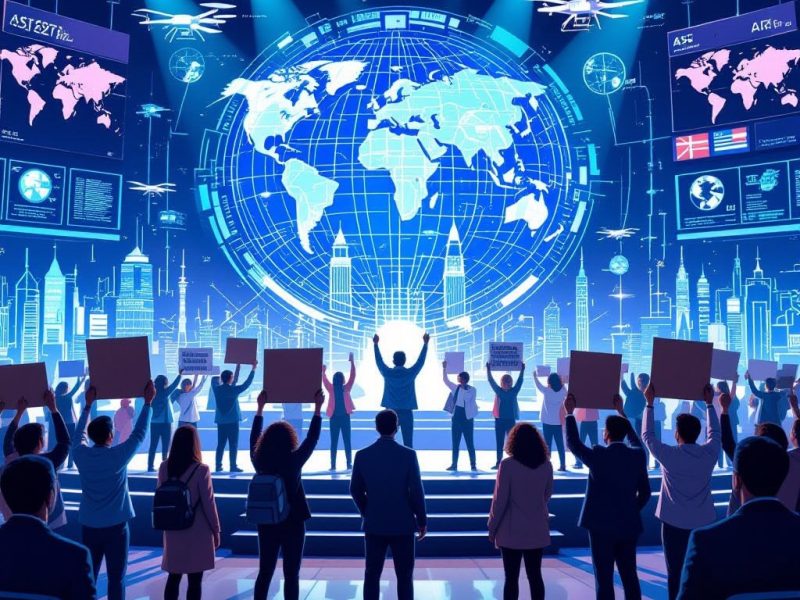Introduction: When AI and Ethics Collide
Microsoft Build 2025 was poised to be a landmark event, showcasing innovations in generative AI, quantum computing, and cloud ecosystems. But the keynote took an unexpected turn when a group of tech workers interrupted the presentation, chanting slogans and holding banners protesting Microsoft’s alleged AI contracts supporting Israeli defense technologies. The disruption lasted less than five minutes, but it sent shockwaves through the industry.
What Happened at Build 2025?
During Satya Nadella’s opening keynote, several protesters stood up in the audience and chanted “AI for Peace, Not War!” and “No Tech for Apartheid!” before being escorted out by security. The group responsible, identified as “Tech Workers for Palestine,” released a statement calling for Microsoft to cease any business operations involving military applications and surveillance systems used by the Israeli government.
Similar protests occurred at Google and Amazon over the controversial Project Nimbus, and now Microsoft faces the same scrutiny.
The Controversial AI Contracts
In 2022, Microsoft entered several strategic partnerships to expand AI infrastructure globally. Critics allege that among these deals are contracts that indirectly support military surveillance and combat operations through cloud services and AI models. While Microsoft has not confirmed direct involvement in defense applications for Israel, transparency has been limited, fueling speculation.
Activism in Big Tech
The last decade has seen a surge in tech employee activism. From Google employees walking out over sexual misconduct policies to Amazon workers striking for climate action, a cultural shift is emerging. Many developers, engineers, and designers no longer want to be passive participants in how their work is used — especially when tied to warfare or state surveillance.
The latest protest adds to a growing movement of conscience-driven employees demanding more ethical governance from tech giants.
The Ethics of Artificial Intelligence in Conflict Zones
The ethical use of AI in warfare is one of the most contentious debates in the 21st century. Critics argue that AI-powered facial recognition, drones, and predictive surveillance have the potential to escalate conflicts and violate human rights. Proponents insist that these tools can be used to minimize civilian casualties and improve defensive security.
However, when these tools are applied in asymmetric conflicts—where one side holds disproportionate power—the lines blur between defense and oppression.
Microsoft’s Response
Following the protest, a Microsoft spokesperson stated that the company “remains committed to responsible AI principles” and will “continue engaging with stakeholders to ensure technology is used ethically.” However, the company has not released specific details about their partnerships involving Israel or military applications.
This lack of transparency has only intensified public pressure. Several employees have anonymously voiced their discomfort, calling for an internal audit and third-party ethics review of all defense-related AI collaborations.
The Industry’s Dilemma
Big Tech firms are increasingly involved in national security and defense projects. While governments argue that AI development is a matter of strategic necessity, critics warn of mission creep — where innovation gradually becomes complicit in systems of control and harm.
Even in democratic societies, the oversight of such collaborations is murky at best. Activists argue that without strong accountability frameworks, technology built for good could easily be repurposed for surveillance, censorship, and oppression.
Palestine, Global Solidarity, and Corporate Power
The Palestinian struggle has become a lightning rod for global debates around justice and tech ethics. From universities to boardrooms, calls for divestment, boycotts, and corporate disengagement with Israeli state institutions are growing louder. In the digital age, solidarity isn’t just about protests—it’s about code, data, and who controls it.
As AI becomes central to geopolitical strategies, employees are realizing that their labor can either empower or resist systemic injustice.
Conclusion: The Call for a New Tech Ethics
The events at Microsoft Build 2025 signal more than just a protest—they represent a generational shift in how tech professionals see their role in shaping the world. It’s no longer enough to innovate; developers are now asking, “Innovate for whom? And at what cost?”
As the AI arms race accelerates, companies like Microsoft must reckon with the reality that ethical lapses won’t be tolerated by their own workforce. In the end, the question isn’t whether AI will be part of global conflict — it’s whether tech workers will allow themselves to be complicit in injustice. For Microsoft, the message is clear: silence is not neutrality.


